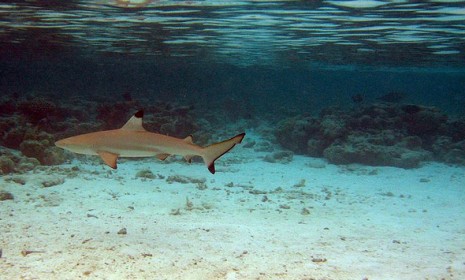Are sharks interbreeding to survive climate change?
Scientists discover 57 rare hybrid sharks swimming off the Australian coast — and suggest two species mated to give their offspring a better shot at survival

A free daily email with the biggest news stories of the day – and the best features from TheWeek.com
You are now subscribed
Your newsletter sign-up was successful
Dozens of rare hybrid sharks have been discovered lurking in the waters off Australia's eastern coast. This surprising find by a team from the University of Queensland has experts speculating that the hybridization may be the result of climate change, which theoretically forced the predators to interbreed in order to better adapt to rising water temperatures. Here's what you should know:
What kind of sharks are they?
The hybrids are the result of multiple generations of two genetically distinct species mating: the Australian black tip shark — "which favors tropical waters," says John Roach at MSNBC — and the larger common black tip, which favors more temperate waters. Covering 1,250 miles of Australian coast, researchers identified 57 hybrid sharks.
The Week
Escape your echo chamber. Get the facts behind the news, plus analysis from multiple perspectives.

Sign up for The Week's Free Newsletters
From our morning news briefing to a weekly Good News Newsletter, get the best of The Week delivered directly to your inbox.
From our morning news briefing to a weekly Good News Newsletter, get the best of The Week delivered directly to your inbox.
How do we know they're hybrids?
Physically, the sharks appeared to look like one species, but upon genetic testing, were found to be another, says Amy Coopes at Discovery News. The hybrid sharks were also found to be stronger than either of the parent species — "a literal survival of the fittest."
And they're interbreeding because of climate change?
Possibly. Researchers suggest that rising ocean temperatures may have encouraged the interbreeding. The hybrids, which can theoretically handle a broader range of water temperatures than either parent species, may be better suited to survive in our changing oceans than either parent.
A free daily email with the biggest news stories of the day – and the best features from TheWeek.com
Sources: Discovery News, MSNBC, United Press International
-
 The ‘ravenous’ demand for Cornish minerals
The ‘ravenous’ demand for Cornish mineralsUnder the Radar Growing need for critical minerals to power tech has intensified ‘appetite’ for lithium, which could be a ‘huge boon’ for local economy
-
 Why are election experts taking Trump’s midterm threats seriously?
Why are election experts taking Trump’s midterm threats seriously?IN THE SPOTLIGHT As the president muses about polling place deployments and a centralized electoral system aimed at one-party control, lawmakers are taking this administration at its word
-
 ‘Restaurateurs have become millionaires’
‘Restaurateurs have become millionaires’Instant Opinion Opinion, comment and editorials of the day